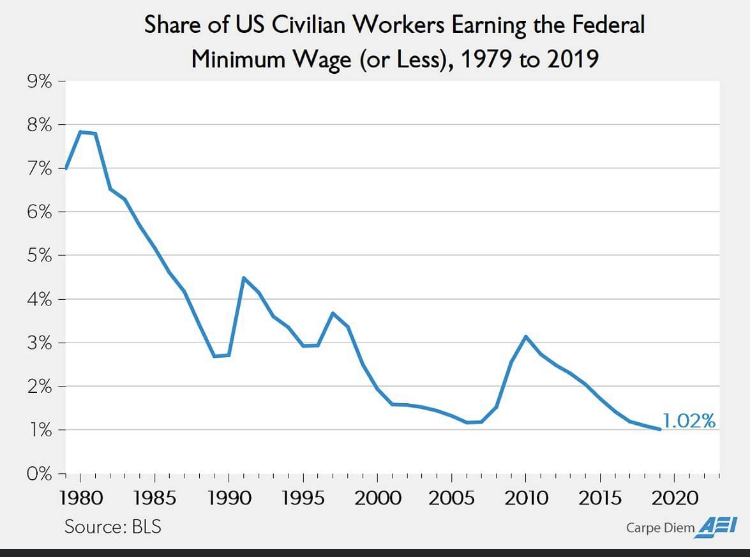Politicians impose higher tax costs on tobacco because they want less smoking. And environmentalists want higher gas prices so there will be less driving.
And, as explained in this video, higher minimum wages for low-skilled labor will reduce employment.
For economists, none of this is surprising and none of this is newsworthy.
Minimum wage laws are a form of price controls, and we have centuries of evidence that bad things happen when politicians try to rig the market.
When I discuss this issue, people often respond by asserting that businesses will treat people like dirt in the absence of government intervention.
I answer them by agreeing with their premise (businesses would like to pay everyone as little as possible), but I then share this data, which shows that they’re wrong on facts. To be more specific, nearly 99 percent of workers make more than the minimum wage.

In other words, the free market leads to higher wages (which is why today’s workers earn so much more than previous generations).
And we’ll continue to enjoy economic progress, so long as politicians give the private sector enough breathing room to create more prosperity.
Which is why a mandate for higher minimum wages would be a bad idea.
Indeed, research published by the Harvard Business Review shows that the minimum wage even can be bad news for the workers who don’t lose their jobs.
Here is a description of the methodology used by the authors (Qiuping Yu, Shawn Mankad, and Masha Shunko).
…minimum wage policies…can influence firms’ behavior in a variety of complex, interrelated ways. In addition to changing employment rates, studies suggest that firms may strategically respond to minimum wage increases by changing their approaches in other areas, such as worker schedules. This can have significant implications for employee welfare… To address these challenges, we conducted a study in which we…looked at worker schedule and wage data from 2015 to 2018 for more than 5,000 employees at 45 stores in California — where the minimum wage was $9 in 2015, and has increased every year since then — and at 17 stores in Texas, where the minimum wage was $7.25 for the duration of our study. We then controlled for statewide economic and employment differences between California and Texas in order to isolate just the impact of increasing the minimum wage.
Here are some of their results.
For every $1 increase in the minimum wage, we found that the total number of workers scheduled to work each week increased by 27.7%, while the average number of hours each worker worked per week decrease by 20.8%. …which meant that the total wage compensation of an average minimum wage worker in a California store actually fell by 13.6%. This decrease in the average number of hours worked not only reduced total wages, but also impacted eligibility for benefits. We found that for every $1 increase in minimum wage, the percentage of workers working more than 20 hours per week (making them eligible for retirement benefits) decreased by 23.0%, while the percentage of workers with more than 30 hours per week (making them eligible for health care benefits) decreased by 14.9%. …our data suggests that the combination of reduced hours, eligibility for benefits, and schedule consistency that resulted from a $1 increase in the minimum wage added up to average net losses of at least $1,590 per year per employee — equivalent to 11.6% of workers’ total wage compensation.
Gee, is anybody surprised to see bad results from California?
But let’s focus on the minimum wage, not on the (formerly) Golden State.
Here’s the bottom line: I’ve explained that a higher minimum wage is theoretically bad.
And I’ve shown that it leads to higher unemployment.
But this new research is important because it shows that a higher minimum wage also backfires on the workers who don’t lose their jobs.
That’s an argument I’ve made before, but it needs to become a bigger part of the discussion.
The goal should be to help people climb the ladder of economic opportunity, which is why the minimum wage should be abolished rather than increased.
P.S. It’s disgusting that labor bosses push for a higher minimum wage to hurt low-skilled workers who compete with union members and it’s disgusting that big companies like Amazon push for a higher minimum wage to hurt small businesses that compete with them for customers.



